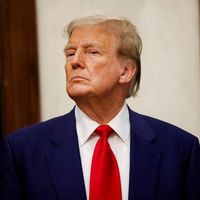UK Minister Says Iran Guards Sanctioned, Europe Keeps Up Diplomacy
James Cleverly, the British foreign secretary, has again said that the United Kingdom has sanctioned Iran’s Revolutionary Guard Corps “in its entirety.”
The British foreign office tweeted Tuesday a clip of Cleverly listing British sanctions against Iran where he mentions judges, morality police, individuals and companies allegedly involved in supply military drones to Moscow, as well as “the IRGC in its entirety.”
Cleverly December 13 said in parliament, according to the official record: “We already sanction the IRGC in its entirety.” But questioned immediately before this on the government’s intentions by John Spellar, a parliament member, Cleverly suggested that any IRGC designation remained in its future plans: “The UK is committed to holding Iran to account, including with more than 300 sanctions—including the sanctioning of the Islamic Revolutionary Guard Corps in its entirety.”
The UK announced December 9 the sanctioning of ten Iranian officials connected to Iran’s judicial and prison systems. “There is growing frustration that the Islamic Revolutionary Guards Corps (IRGC) the branch of the Iranian army accused of peddling terror abroad, has escaped sanctions that would see it proscribed,” claimed the right-wing Daily Telegraph newspaper the following day. Neither was the IRGC mentioned when the UK December 13 sanctioned Iranians purportedly involved in transferring drones to Russia.
The United States government in 2019 included the IRGC in its list of ‘foreign terrorist organizations,’ a move announced by Secretary of State Mike Pompeo as the US “continuing to build its maximum pressure campaign against the Iranian regime.” The Trump administration had the previous year launched ‘maximum pressure’ sanctions as it withdrew from the 2015 Iran nuclear agreement, the JCPOA (Joint Comprehensive Plan of Action).
This remains the only example of Washington including part of a sovereign state’s armed forces as a ‘foreign terrorist organization,’ a category otherwise comprised of non-state groups. The US 2019 press release on the listing referred to the IRGC “in its entirety,” the same phrase used by Cleverly.
Critics of JCPOA have long argued for designating the IRGC, with Canada following the US in October. During talks aimed at restoring the 2015 agreement, which have foundered since late summer leaving Iran’s nuclear program expanding and ‘maximum pressure’ in place, there have been intermittent reports of Iran seeking to have the designation lifted.
‘Moving talks forward’
Peter Stano, the European Union foreign affairs spokesman, Monday defended the “diplomacy” and “engagement” seen in EU foreign affairs chief Josep Borrell meeting with Iran’s foreign minister Hossein Amir-Abdollahian in Jordan December 20. Given the EU role coordinating multilateral nuclear talks in Vienna April 2021-March 2022 and subsequent bilateral Iran-US meetings, Stano said the meeting had been part of moving “talks about the revival of the JCPOA forward.”
In Tehran, Javad Karimi-Qudousi, a conservative member of the parliament’s national security commission, told the reformist newspaper Etemad that progress had been made on two issues stymying the talks – an enquiry by the International Atomic Energy Agency into Iran’s pre-2003 nuclear work and the status of foreign investment should the US again leave the agreement.
There has been ongoing speculation in Israel that failure to renew the JCPOA will lead to an Israeli attack. With Benjamin Netanyahu, a virulent JCPOA opponent due to form a new government including the Religious Zionism Party, Lieutenant-General Aviv Kohavi, the Israeli chief of staff, said Tuesday the “level of preparedness for an operation in Iran has dramatically improved.”
While he would “say no more than that,” Kohavi promised the armed forces would be “ready for the day when an order is given to act against the [Iranian] nuclear program.” Kohavi, who was Israeli Operations Director during the December 2008-January 2009 Gaza conflict when 1,400 Palestinians and 13 Israelis died, claimed Israel carried out at least one operation “against Iran” weekly somewhere across the Middle East.







